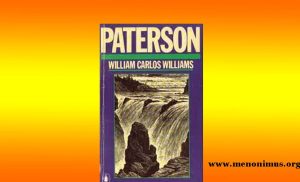Paterson | W Carlos Williams-A Review
Paterson W Carlos Williams-A Review
Paterson by William Carlos Williams-A Review
Introduction:
‘The Paterson,’ written by the renowned American poet William Carlos Williams, is a unique and ambitious work that delves into the heart of the industrial city of Paterson, New Jersey. Published in five separate volumes over a span of several decades (1946, 1948, 1949, 1951, and posthumously in 1963), ‘The Paterson’ is a collection of poems that interweave Williams’s personal experiences, observations, and philosophical musings with the city’s physical and emotional landscapes.
Captivating Imagery and Language:
Williams’s poetic prowess shines in ‘The Paterson,’ as he masterfully uses language to paint vivid and distinct images of urban life. The precision and clarity of his language capture the essence of Paterson’s bustling streets, factories, and diverse inhabitants. His use of concise yet evocative descriptions brings the city and its people to life, making them almost tangible to the reader. Through carefully chosen words and phrases, Williams conveys the noise, chaos, and vitality of Paterson, enabling readers to experience the city’s ambiance firsthand.
Exploration of Urban Humanity:
At the core of ‘The Paterson’ lies Williams’s exploration of human existence within the urban environment. He presents a mosaic of characters, each representing a facet of the city’s social fabric. From laborers in factories to immigrants seeking better lives, Williams portrays the struggles, aspirations, and dreams of individuals caught in the machinery of urban life. By intertwining their stories with his own introspective meditations, the poet highlights the complexities of human nature and the universal experiences that transcend time and place.
Aesthetic and Ethical Dimensions:
One of the remarkable aspects of ‘The Paterson’ is its engagement with both aesthetic and ethical considerations. Williams doesn’t merely describe the city’s physical aspects; he also delves into the ethical implications of urbanization, industrialization, and societal change. This adds depth to his work, inviting readers to ponder the moral dilemmas posed by progress and the consequences of human actions on the environment and community.
Structural Innovation:
Williams employs a distinctive structural approach in ‘The Paterson,’ utilizing various poetic forms and styles to reflect the multifaceted nature of the city. He incorporates diverse voices, including historical figures, local legends, and ordinary citizens, to create a polyphonic narrative that mirrors the diversity of Paterson itself. This experimentation with form and voice adds layers of complexity to the work, rewarding readers with a rich and dynamic reading experience.
The Influence of Modernism:
As a prominent figure in the Modernist literary movement, Williams’s ‘The Paterson’ reflects many characteristics of this artistic period. The fragmentation of narrative, the incorporation of everyday language, and the exploration of the individual’s relationship with their surroundings are all hallmarks of Modernist literature. Williams pushes the boundaries of traditional poetic conventions, challenging readers to engage with his work on multiple levels.
Conclusion:
‘Paterson’ by William Carlos Williams stands as a testament to the poet’s innovative spirit, linguistic precision, and profound insight into the human condition. Through its captivating imagery, exploration of urban life, ethical contemplations, and structural experimentation, the work offers readers a remarkable journey into the heart of an industrial city and the souls that inhabit it. This collection continues to resonate as a powerful depiction of the modern urban experience and a timeless exploration of what it means to be human. 0 0 0.
You May Like: The Satanic Verses by Salman Rushdie-A Review
N. B. The article originally belongs to the book ‘The Reviews of Epic Literature Around the World Vol-I‘ by Menonim Menonimus.








